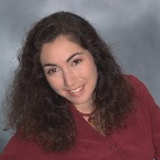Gabriela Weaver
Professional Bio:
Research in the Weaver Chemical Education group is focused on developing, implementing and assessing innovative instructional materials and methods. Our goal is to use these to achieve greater retention of students in the sciences, to help them develop a better understanding of the material, and to motivate their interest in the subject.
One aspect of our work is to examine how instructional technologies can be designed and used in the classroom. Some of this work involves evaluating technologies that already exist, and determining ways that they can be used for greatest educational impact. In other cases, we are involved in designing instructional technologies, or materials that will be used with instructional technologies. The development is often carried out in collaboration with researchers and developers with specific expertise in those areas. We have developed an interactive DVD as a supplement for Physical Chemistry, including video programs, animations and problems for students to solve. We have also designed, developed and tested a computer game that has embedded chemistry challenges within a larger storyline that challenges the player/student to solve an overall mystery.
In another area of our work, we are involved with student inquiry and “authentic science practice.” This work builds on a constructivist framework of learning and endeavors to provide opportunities for students to develop their reasoning and experimental design skills. Our research in this area is quite varied, involving design of new “wet chemistry” experiments, analysis of student discourse, assessment of students’ conceptions of the nature of science, and examination of models to bridge the research and educational missions of higher education. The CASPiE initiative has resulted from this arena of our work. An interesting component of this project is our remote instrumentation network, which allows students and faculty from schools anywhere in the world to run their samples on our instruments via a standard Internet connection.
Our group also looks at the more theoretical aspects of learning chemistry. For example, some of our research has explored the effects of student discourse, group collaborative work, peer instruction and context-situated learning. We use a combination of quantitative and qualitative research methods - standard statistical analysis software as well as a variety of ethnographic qualitative methods, including interviews, surveys, observations and document analysis.
Overall, the goal of our research is to understand how to improve the teaching and learning process in chemistry, especially as the demographics and learning styles of college students change.


